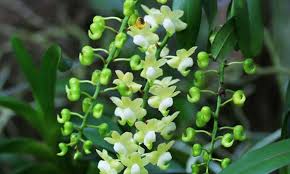
Dendrobium orchids, known for their stunning and diverse blooms, are a favorite among both novice and experienced orchid enthusiasts. To achieve the best growth and flowering, it is crucial to understand the role of nutrients, particularly vitamins and flowering hormones. This article delves into how these elements impact the health and blooming of Dendrobium orchids and provides insights into their effective use in orchid care.
## 1. Overview of Dendrobium Orchids
### 1.1 General Characteristics
Dendrobium orchids belong to the family Orchidaceae, consisting of over 1,800 species. They are native to tropical and subtropical regions of Asia, Australia, and the Pacific Islands. Known for their long-lasting flowers and unique growth habits, Dendrobiums can be classified into two main types: deciduous and evergreen.
– **Deciduous Dendrobiums**: These orchids lose their leaves during the dormant season and typically flower in spring and summer.
– **Evergreen Dendrobiums**: These varieties retain their leaves year-round and can bloom multiple times throughout the year.
### 1.2 Importance of Flowering
For orchid enthusiasts, flowering is one of the most rewarding aspects of orchid cultivation. The blooming of Dendrobium orchids not only adds aesthetic value to any space but also signifies the health and vigor of the plant. Understanding how to promote flowering is essential for any grower looking to enjoy the beauty of these remarkable orchids.
## 2. The Role of Vitamins in Orchid Health
Vitamins are essential organic compounds that play a vital role in the growth and overall health of Dendrobium orchids. They contribute to various physiological processes, including photosynthesis, metabolism, and stress response.
### 2.1 Essential Vitamins for Dendrobium Orchids
#### 2.1.1 Vitamin A
Vitamin A is crucial for the growth and development of Dendrobium orchids. It is involved in:
– **Photosynthesis**: Enhancing the efficiency of light absorption and energy production.
– **Growth Regulation**: Supporting cell division and growth, particularly in the early stages of development.
#### 2.1.2 Vitamin B Complex
The B vitamins, including B1 (thiamine), B2 (riboflavin), and B6 (pyridoxine), play essential roles in various plant functions:
– **B1 (Thiamine)**: Promotes root growth and helps plants adapt to stress.
– **B2 (Riboflavin)**: Aids in the synthesis of chlorophyll, enhancing photosynthetic efficiency.
– **B6 (Pyridoxine)**: Involved in amino acid synthesis and hormone regulation.
#### 2.1.3 Vitamin C
Vitamin C acts as an antioxidant, protecting Dendrobium orchids from oxidative stress. It is essential for:
– **Photosynthesis**: Enhancing the photosynthetic process.
– **Disease Resistance**: Improving the plant’s immune response to pathogens.
#### 2.1.4 Vitamin D
While not commonly discussed in the context of orchids, vitamin D may influence calcium metabolism, which is crucial for healthy growth and flowering. Adequate calcium levels are essential for cellular structure and function.
### 2.2 Sources of Vitamins
Dendrobium orchids can obtain vitamins from various sources:
– **Commercial Fertilizers**: Many orchid fertilizers contain B vitamins and other essential nutrients.
– **Natural Supplements**: Nutrient-rich additives like seaweed extract and fish emulsion can provide vitamins to orchids.
– **Homemade Solutions**: Growers can create vitamin-rich solutions using ingredients like banana peels (for potassium and vitamins) and other organic matter.
## 3. Flowering Hormones and Their Effects
Flowering hormones, also known as phytohormones, are crucial for regulating the growth and flowering processes in Dendrobium orchids. The main hormones involved in flowering include auxins, gibberellins, cytokinins, and ethylene.
### 3.1 Key Flowering Hormones
#### 3.1.1 Auxins
Auxins are responsible for promoting cell elongation and differentiation. They play a role in:
– **Root Development**: Encouraging the growth of healthy root systems, which are vital for nutrient uptake.
– **Flower Initiation**: Influencing the transition from vegetative growth to flowering.
#### 3.1.2 Gibberellins
Gibberellins promote flowering and fruit development. They are essential for:
– **Stimulating Flowering**: Enhancing the flowering process, particularly in Dendrobium orchids that require specific environmental cues to bloom.
– **Increasing Flower Size**: Promoting larger and more robust flower structures.
#### 3.1.3 Cytokinins
Cytokinins promote cell division and growth, influencing various aspects of plant development, including:
– **Bud Formation**: Encouraging the development of flower buds.
– **Leaf Expansion**: Supporting overall plant vigor and health, which is crucial for flowering.
#### 3.1.4 Ethylene
Ethylene is a gaseous hormone that regulates various aspects of plant growth and development, including:
– **Flower Opening**: Inducing flower opening and promoting longevity.
– **Fruit Ripening**: Influencing the maturation process, although this is more relevant for fruiting plants.
### 3.2 Application of Flowering Hormones
To promote flowering in Dendrobium orchids, growers can use various methods to apply flowering hormones effectively:
– **Commercial Growth Regulators**: These products are specifically formulated to contain the desired hormones. Follow the manufacturer’s instructions for application rates and frequency.
– **Foliar Sprays**: Hormonal solutions can be applied directly to the leaves for quick absorption. This method is particularly effective for stimulating flowering.
– **Root Drenches**: Applying hormone solutions to the potting medium can encourage root development and overall plant vigor, which in turn supports flowering.
## 4. Benefits of Using Vitamins and Flowering Hormones
Using vitamins and flowering hormones can significantly enhance the health and blooming of Dendrobium orchids. Here are some key benefits:
### 4.1 Improved Flowering Rates
Regular application of vitamins and hormones can lead to more frequent and abundant flowering. This is particularly beneficial for growers who want to maximize their orchid’s blooming potential.
### 4.2 Enhanced Flower Quality
The use of vitamins and hormones can lead to larger, more vibrant flowers with improved color and fragrance. Healthy plants with adequate nutrients and hormones produce superior blooms that are more visually appealing.
### 4.3 Increased Resilience
Plants treated with vitamins and hormones are often more resilient to environmental stressors, diseases, and pests. This resilience leads to healthier orchids that can withstand challenges better than untreated plants.
### 4.4 Optimal Growth Conditions
By understanding and managing the nutritional and hormonal needs of Dendrobium orchids, growers can create optimal growing conditions that support healthy growth and flowering.
## 5. Practical Tips for Applying Vitamins and Hormones
To effectively use vitamins and flowering hormones in Dendrobium orchid care, consider the following practical tips:
### 5.1 Timing and Frequency
– **During Growing Season**: Apply vitamins and flowering hormones during the active growing season (spring and summer) when orchids are most receptive to nutrients and hormonal stimulation.
– **Before Flowering**: Increase the frequency of applications as your orchids approach their blooming period to encourage bud formation and flowering.
### 5.2 Dilution and Application
– **Follow Instructions**: Always follow the manufacturer’s guidelines for dilution and application rates to avoid over-fertilizing or damaging your orchids.
– **Start Low and Adjust**: If you are new to using these products, start with a lower concentration and gradually increase it as needed based on the plant’s response.
### 5.3 Observation and Monitoring
– **Watch for Changes**: Regularly monitor your orchids for signs of improvement or distress after applying vitamins and hormones. Look for new growth, healthy leaves, and developing buds.
– **Adjust Care as Needed**: Based on your observations, adjust your care routine to meet the specific needs of your orchids.
## 6. Common Mistakes to Avoid
While using vitamins and flowering hormones can greatly benefit Dendrobium orchids, certain common mistakes should be avoided:
### 6.1 Over-Application
Using too much fertilizer or hormones can lead to root burn, leaf yellowing, and overall plant stress. Always adhere to recommended application rates.
### 6.2 Ignoring Plant Needs
Different Dendrobium varieties may have unique requirements for vitamins and hormones. Research the specific needs of your orchid type to tailor your care routine effectively.
### 6.3 Neglecting Other Care Aspects
While vitamins and hormones are important, they should not replace other essential care practices such as proper watering, light exposure, and potting medium management.
## 7. Conclusion
The use of vitamins and flowering hormones is vital for promoting the health and flowering of Dendrobium orchids. Understanding the roles of these nutrients and hormones, as well as their effective application, can lead to stunning blooms and robust plants. By following the guidelines outlined in this article, orchid enthusiasts can ensure their Dendrobium orchids thrive, resulting in beautiful displays of nature’s artistry.
As with any gardening endeavor, patience and observation are key. Regularly assess your orchids’ health and adjust your care routine based on their specific needs. With dedication and the right approach, your Dendrobium orchids can flourish, bringing joy and beauty to your home or garden for years to come.


